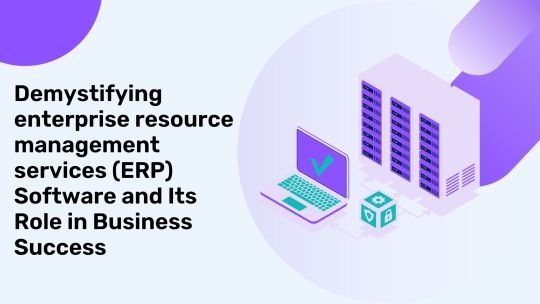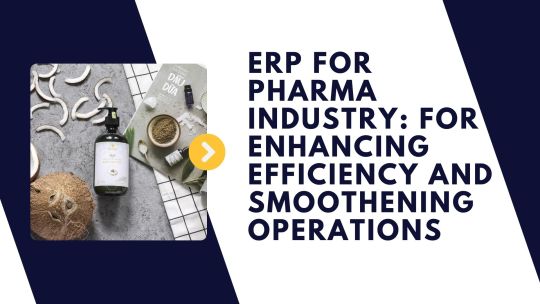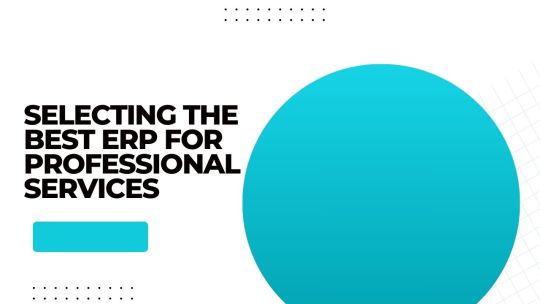Don't wanna be here? Send us removal request.
Text
How Enterprise Resource Management Services Enhance Business Efficiency

The purpose of enterprise resource management services in today's competitive business environment is very important, considering basic issues of improving efficiency. The service can help streamline the flow of business operations, reduce costs, and enable a business to accomplish more with full control over business processes. Apt enterprise resource planning erp software has the potential to revolutionize resource
0 notes
Text
Demystifying enterprise resource management services (ERP) Software and Its Role in Business Success

In this blog, we go inside the explanation of what enterprise resource management services software is and how it can seriously make your business soar to great heights of success. Whether it be a new consideration towards implementing ERP or you are planning to upgrade, understanding what role ERP plays in actual digital transformation is important. Topics covered will include what it is, benefits, choices in deployment, and implementation. Some interesting facts and statistics on this software.
Mej erp ai is a best website for enterprise resource management services. This website main service is provide good software solution in logistic, Retail,real state, banking, pharmaceutical,food beverage and professional services
ERP, which stands for enterprise resource planning erp software, is an integrated and automating comprehensive business management software for a business to handle its core processes. In general, those processes are linked to finance, sales, marketing, human resources, operations, and manufacturing, to name just a few. In simple terms, a working ERP solution is what makes all processes in business to be streamlined and into a single integrated system.
From their early legacy versions, erp software systems have traveled a far distance and have become essential to modern business. Today, ERP solutions are presented in a cloud business model and depend on advanced technologies like Data Analytics, Artificial Intelligence, Machine Learning, and Internet of Things. These technologies afford powerful data-driven insights and automation that a business can leverage for enhanced efficiency and productivity. Modern cloud erp software systems enable seamless connectivity of operations, both internally and externally, supporting effective collaboration, speed, and agility in an ever-evolving market.
Why is ERP Critical for Business Strategy?
This is what ERP does: ERP is the backbone of a business, housing everything from integration, automation, and business intelligence, down to end-to-end operations efficiently executed. It captures the most critical information, offering a single source of truth across an organization. Management, decision-makers, and other stakeholders can base their informed decisions upon such reliable and timely data.
An Effective ERP Becomes Crucial
A sound ERP system is not just another software tool; it changes the way businesses manage their processes and, more appropriately, their processes in today's data-driven world. Good business happens when the processes are flawless, as does digital transformation. These factors are important for keeping businesses both competitive and in a state of sustainable success.
Key ERP Facts and Statistics
This in itself, however, will not be enough to install the system. Choosing the appropriate ERP system and vendor along with a business strategy that is proper and strong makes up the really important movement toward a successful ERP System Implementation. The growing international trade, digitalization, and the effective management of data lead to the ERP market growth."'";
"The companies that implement ERP reduce costs, enhance performance and raise productivity, thus ensuring business success'";
ERP MODULES AND OBJECTIVES
ERP systems normally include these following modules and customization that pertaining to a specific business:
Finance modules that were designed for general ledger, accounts payable, accounts receivable, financial statements, compliance.
Human resources modules include time and attendance, payroll, employee management, reporting, and HR analytics.
Procurement modules are designed in automating and centralizing the purchasing of supplies, assortment assortment, support for quotes, contracts, and the approval process.
Sales modules in managing relations with customers, sales pipelines, and order cycles.
Manufacturing: Steps of the production of the product, planning with materials, quality assurance.
Logistics & Supply Chain Management: Monitors inventory, warehousing, transportation, and logistics.
Customer & Field Service: Enhances customer service management and field service.
Data Analytics & Business Intelligence: Real-time reporting and insights with full support for making data-driven decisions.
ERP Features
While speaking about the huge impact on businesses, it is obvious. With centralized data and work management, the inter-departmental working is much better in the ERP systems, which are providing lots of features that include the following:
Better business insights with real-time reporting.
Lower operational cost through process optimization.
Better collaboration throughout the organization.
Streamlined business with standard processes.
Lesser risk because of improved data integrity and controls.
Better productivity through automated process.
Improved data-driven decision-making.
ERP Deployment Options
At the moment, there are many ways in which business can deploy ERP systems :
Cloud ERP: The systems is hosted in the cloud and is accessed through the internet. The software is managed by the provider.
On-Premise ERP: ERPs are installed on company servers and are managed internally.
Hybrid ERP: A mix of public and on-premise for the standard, basic public cloud offering.
TCO:
Also part of the investment in an ERP system is the outlook into the future in terms of the total cost of ownership and return on investment. This is more probable when cloud-based ERP systems are in use. Their initial investment is much cheaper than their on-premise counterparts. However, the ultimate cost will depend on the vendor chosen, the modules, and the deployment method.
As organizations embrace their journey of digital transformation, ERP systems are in the front line of such change. More companies are embracing a much stronger form of ERP solution at the helm within the organization to replace the old system and processes. Some of the most prominent inclinations include the escalation of the cloud-based ERP, integration capabilities, personalized user experience, and quickly emerging support of emergent technologies such as AI and the IoT.
Conclusion
Generally speaking, ERP will play a very critical part in any business strategy in order to equip the required tools and insights into the management of operations. And as businesses continue to evolve, so does the very role of ERP to ensure great success and competitiveness not only for medium businesses but also for large enterprises. Choosing the right erp software for small business —in fact, either it is small or large business—ensures long-term success.
0 notes
Text
Comprehensive Guide to ERP Software for Retail Industry

Retail ERP vs. Traditional ERP
A erp software for retail industry system is catered to the special processes of multi-channel or omnichannel retailers. On the other hand, a traditional best erp software for retail is outfitted for general business requirements in different industries, e.g. manufacturing or construction. In retail ERP software, the center modules developed are around the workflow of the retail industry.
Some erp software for retail, for example, Brightpearl, can be designed such that they are retail ERPs. When you are looking for a retail version of classic ERP, you are spoilt for choice. Examples of ERP and accounting systems are Acumatica, NetSuite, Microsoft Dynamics 365, SAP Business One, and QuickBooks POS, to name just a few, whose frontend can be integrated with QuickBooks Desktop accounting software.
It pays to buy Quickbooks products and services from a value-added reseller that possess the experience in POS and the level of retail expertise to ensure your QuickBooks retail solution is fine-tuned.
It is possible to fit into a retail and traditional ERPs with an add-on software that serves with purpose specifically for retailers. For Example, AP automation or global mass payments software, for retailers ; Tipalti .Software has enabled companies like Touch of Modern to effectively handle accounts payable and large payment workflows with a small team.
Retail ERP Benefits
The ten good things in a retail ERP are:
Real-time visibility reporting and payment processing
An integrated omnichannel system across the front and back ends
Centralized customer database
eCommerce and physical store integration with an automated POS
Demand forecasting capability
Intelligent procurement, replenishment, and supply chain management
Real-time inventory management
Dynamic pricing capability
Automation in processes for efficient cost savings
Data analytics to support data-driven decision making.
Retail ERP is a real-time, specially customized software system connecting and integrating business processes involved in retail operations. A retail ERP enables retailers to better streamline, automate, and manage front-end and back-office business processes. This is software specially customized for ERP that's designed to help retailers improve their bottom line.
Multichannel commerce involves driving sales through physical retail stores (brick-and-mortar), e-commerce, call centers, and other online sales channels. They may access one or more warehouses and rely on inventory management to fulfill the orders and manage returns.
Automate and Extend Your Retail ERP
Tipalti powers efficiency and enhanced functionality in accounts payable. For businesses, our touchless invoice processing solutions reduce your business expenses.
Best Retail ERP Software Solutions
The erp software for retail business are either specifically designed for the retail sector or part of the traditional ERP systems, add-on third-party integrations poised at elevating the ERP for retail operations.
ERP Systems That Can House Retail-Specific Needs
Some best available ERP systems for retailers include:
Brightpearl
Brightpearl – A review
Brightpearl is an omnichannel retail ERP software solution designed for retailers and wholesalers.
The company bills its software as a Digital Operations Platform that can process thousands of orders daily. Brightpearl is purpose-built retail ERP. It offers eCommerce integrations with BigCommerce, Magento, Shopify, Amazon, eBay, and even Walmart these are erp software for retail shop.
Stated differently, Brightpearl, the retail version of Sage, allows for:
Real-time data
Sales order management
Inventory management and demand planning
Shipping and fulfillment
Warehouse management
Retail accounting
Purchasing and supplier management
Workflow automation
Reporting and business intelligence
Built-in, pre-integrated third-party app solutions for new channels and functional tools
SAP Business One
SAP Business One is ERP software that functions in the cloud for small and mid-sized businesses. By augmenting the following functionality to the ERP software, retailers using SAP Business One get support for:
eCommerce and omnichannel
Back office, online, and in-store operations
Point of sale and payment processing
In-store and inventory management
Analytics and reporting
Acumatica Retail-Commerce Edition
Acumatica
This is Acumatica's retail and eCommerce ERP solution. It is a multi-channel, cloud-based software, and it is best branded as the 'Retail-Commerce Edition' by small and middle-market businesses. Acumatica offers 24/7 customer service as a core feature in ERP.
It has other features such as:
Financial management
CRM
Warehouse management
Sales Order Management
Customer Self-Service Portal
Reporting and data analysis tools
Inventory management
Purchase
0 notes
Text
Erp for pharma industry: For Enhancing Efficiency and Smoothening Operations

With increasing costs and the burden of dealing with patients' information, pharmaceutical manufacturers are always on the lookout for different ways to be efficient. One such solution that is nowadays adopted more and more is best erp for pharmaceutical industry.
Enterprise Resource Planning has multi-dimensional roles for pharmaceutical operations. In real practice, pharma ERP software is a suite of integrated applications delivered as software service, which helps centralize and integrate data coming from business processes that entail manufacturing, vendor cost management, accounting systems, supply chain visibility, raw material management, procurement, inventory management, and compliance management pharma erp.
In a pharmaceutical company talking about Mej ERP AI is provide best pharmaceutical services for all users so i suggest you please freely register Mej ERP AI, an ERP system controls all critical functions and delicate operations of manufacturing drugs. They optimize manufacturing right from the pre-formulation management to raw materials and formulation. A well-designed ERP can also handle clinical trial arrangements, expiry management, batch tracking, and quality assurance while ensuring stringent regulations are followed across countries. ERP systems break down data silos, enhance data accessibility, improve patient care, streamline operations, and reduce costs erp for pharma industry.
ERP Replacement Drives Growth
A biopharm company that anticipated fast growth needed a new ERP system for optimized management. Ultra Consultants helped find a solution tailored to meet the requirements of an ERP.
What is ERP, and how does it work in Pharmaceutical Companies?
The erp for pharmaceutical serves as the glue binding together data from various departments within the pharma company, helping to make better decisions and to integrate information. The ERP system of a pharmaceutical or medical device company will give a broad view of production, quality management, administrative processes, and financial management.
It is observed that most pharmaceutical companies' information systems are partitioned into specialized subsystems with no interoperable capability. It creates complexity, inefficiencies, and increased costs. In answer to these challenges, the pharma erp software bestows one umbrella under which all data and relevant processes are integrated with seamless operations, added collaboration, and improvisation to the patient.
Challenges in Pharmaceutical Industry
There are several factors pharmaceutical erp software that hamper the productivity and growth of the pharmaceutical manufacturing sector. Some of these are mentioned below:
Changing Government Regulations
Government regulations in the software for pharma industry are dynamic. Compliance is essential to the safety of products, market access, and the safety of consumers. Among the drug and healthcare reforms to the quality standards and practices at an international level, the regulatory environments of pharma companies in operation are faced with a lot of complexities. There is a danger of losing products in the market, regulatory actions, fines, and reputational damage to companies in case they do not comply.
Supply Chain Disruptions
The erp software for pharmaceutical industry chain is very complex with numerous suppliers and distributors. Disruption of such supply chains has great effects on the health of patients, public trust, and business performance. Companies must be able to manage a plethora of uncertainties, from the supply of raw materials and transportation challenges to unplanned events—be it natural disasters or pandemics. Coordination and visibility are both key.
Quality Control
Quality control in the pharmaceutical industry is very stringent. It additionally expects manufacturers to achieve robust standards so that products can ensure safety, efficacy, and compliance. Involving extensive testing, inspections, and documentation, quality control could become very hard to handle through manual operation or by using an old system.
Inventory Management
Pharma companies handle inventory items in many diverse kinds with special storage and handling requirements. Effective inventory control or management will thus ensure that the inconvenience of stockouts is avoided, waste is reduced to a minimum, and delivery time is within schedule. On the other hand, manual inventory processes are time-consuming, prone to error, and inefficient, increasing costs and causing operational problems.
Shortage of Skilled Labor
The pharmaceutical industry requires a highly skilled workforce to drive innovation, compliance, and great product quality. Therefore, there is an acute shortage of skilled labor, making it difficult to attract and retain the best talent. Manufacturers have to invest in training and human resource optimization to maximize output.
How ERP Software Helps Pharma Companies Overcome Challenges
Such pharmaceutical manufacturing software can help companies overcome these challenges and optimize their operations. Here's how ERP software can help your pharma company:
Regulatory Compliance Management
The ERP system offers a single platform to deal with and monitor regulatory compliance. Besides, it automatically looks after adherence to quality standards, traces the changing landscape of regulatory requirements, and ensures easy documentation and reporting. ERP software automates the compliance process and diminishes the risk of non-compliance, making auditing easier and less time-consuming.
Efficient Inventory Management.
A pharma ERP system automatically simplifies inventory management, as it gives visibility in real time regarding stock level, expiration, and batch number. It allows one to forecast demand accurately and automatically replenish while optimizing storage and distribution. Generally, ERP software results in very few outages of stock, low carrying cost, and improved total inventory control.
An ERP system in pharmaceutical manufacturing integrates various functions and processes like formulation management, production planning, and quality control. This eliminates manual activities and provides errorless outputs, thereby enhancing the efficiency of operations. The manufacturing capabilities are tuned well, to optimize and scale, and efficiently handle the productions needs using the ERP software system.
Improved Quality Control
An ERP system is, therefore, of great importance in quality control by capturing and analyzing data at every stage of the manufacturing process. This will involve real-time monitoring of quality parameters, automation of quality control processes, and deviation management.ERP software assists in maintaining detailed and accurate records of quality as well as tracking nonconformities through maintianace of compliance in that dimension.
Optimal Supply chain management
A good ERP system offers visibility and control across the pharmaceutical chain, making procurement, inventory, order fulfillment, and real-time collaboration with the suppliers and distributors efficient. On top of that, it facilitates track-and-trace features that optimize procurement, makes demands better, and improves tracing of both forward and backward goods. Financial Management and Cost Control
An enterprise resource planning system assimilates and streamlines financial data while automating the accounting process. It thereby accurately generates each and every report. It allows for the best financial planning, computation, and budgeting. Consequently, it results in informed decision-making and effective control over costs. The ERP system optimizes the financial management process, including improving accounts payables, better availing of receivables, and improving general financial effectiveness.
Benefits of ERP Software to the Pharma Industry
Here are a few benefits that are brought to the industry by pharma ERP software:
Effective Inventory Management
Phama ERP software ensures real-time inventory tracking, optimal stock levels, and reduced wastage or stockouts. The software provides greater traceability for the manufacturer to monitor batches, track raw materials, and guarantee compliance with regulatory bodies. This is, in fact, the visibility that can greatly reduce the potential risks of recall of a product and enhance the inventory management function.
Pharma ERP software provides automated solutions helping the company meet the regulations. It measures, tracks documentation, and supports audits. By using the ERP, companies
can assure their way through the complex maze of regulations confidently.
Streamlined Manufacturing
ERPs streamlined manufacturing, which lets the division become more operationally efficient, minimizing errors and removing production rocks. It gives efficient, optimal production capabilities and forecasts scalability and has control over uncertainties with the supply chain.
Better Quality management
ERP software incorporates quality control processes, thus boosting product traceability and thus minimizing errors, and ensuring good product consistency. ERP software supports the tracking of compliance; this will quickly manage non-compliances and keeps up very detailed records.
Better Financial Management
The ERP software consolidates financial data as it automatically keeps an operational account system and generates robust financial reporting in real-time. It eliminates manual data entry and reconciliation which was prone to error and slow.
This enhances financial planning, cost analysis and budgeting mainly because of the reports easily available
Optimal Supply Chain Management
The ERP software must be embedded with end-to-end visibility and control from the supply chain, for procurement to inventory management and order fulfillment. It further helps the firm in demand forecasting, reducing lead time and enhancing efficiency in the supply chain.
Different types of ERP Systems for Pharma Companies
There are different available types and features of the on-premise ERP systems for the pharma companies in the marketplace:
On-Premise ERP Systems
On-Premise ERP Systems: Installed and maintained at the user firm's physical location, this provides the user full control over both the data and infrastructure. Suitable for big companies, including those that employ their own IT team. Cloud-Based ERP Systems: Usually hosted on the third-party vendor's infrastructure, which provides more flexibility, scalability, and is even cheaper than the on-premise ones mentioned earlier. These are fit for small to mid-range businesses searching for ease of quick installation and non-complicated access to data. Hybrid ERP Systems: These combine on-premise and cloud capabilities in order to give the user the flexibility of on-premise customization with the.
Execution of ERP software in a pharmaceutical industry
Execution of the ERP software requires a lot of planning, customization, and in the handling of change. Important steps involved are thus:
Business needs evaluation
To determine a point of pain, specific to be addressed and functions to be included in the ERP system.
Select the right pharma ERP solution
Choose an ERP that fulfills the needs specific to the pharmaceutical industry.
Customize and configure the ERP
Tailor the ERP in close collaboration with the vendor of ERP.
Data migration and training
Plan data migration and provide appropriate training to your employees in a more comprehensive way.
Change Management
Execute proper change management policy for a smooth transition.
Continuous Improvement
Keep updating and fine-tuning the ERP system regularly to churn at their best.
Conclusion
The pharmaceutical industry is changing tremendously with growing complexities, changing regulations, and customer demands. An ERP system can help your company meet and streamline operations in dealing with needs. A pharma ERP solution will help to streamline inventory management, compliance with the regulatory body, and improve the quality of controlled products and states in the supply chain. All this can make your business operationally excellent, productive, and delivering quality medications and medical devices around the world.
0 notes
Text
Selecting the Best ERP for Professional Services

Most professional services firms are running as custom businesses. Companies making widget A can't just turn on a dime to start cranking out new gizmos when demand arises. Services firms, on the other hand, are purveyors of expertise and can quickly whip up new offerings to meet specific client needs. "Law firms and management consultants and accounting firms can often develop new services on the fly—like consulting on emerging technologies or regulations,".
With the ability to integrate financial management, project management, resource allocation, and client communications into a single platform, Enterprise Resource Planning (ERP) systems have become more than just a requirement for the professional services industry. According to Acumen Research and Consulting, the size of the ERP market for small and medium-sized businesses will increase by 12% over the next ten years, including professional services firms.
What is Professional Services ERP?
The erp for professional services systems are those that deal with professional services firms whose business is basically expertise rather than something solid like a physical product, for example, accounting or law firms. They are made for project-based services and involve software with functions to track billable hours, manage clients, and ensure smooth communication. Other than the domain expertise, there are the core features that characterize such ERPs, which are common to any ERP system, including a single database to consolidate companywide data between finance, CRM, and HR activities professional services erp software.
Better management of relationships with clients
In erp for professional services industry firms, each deal with the client is a customized engagement that calls for excellent service, problem-solving, and communication. The place of an ERP system in this is to act as a one-stop shop in managing client interactions, service histories, and threads of communication. In this way, timely and personalized service can be offered to clients. Features such as comprehensive client views, automated communication flows, and predictive analytics allow firms to be proactive in meeting the needs of their clients and to drive satisfaction best erp for professional services.
Data-Driven Decision-Making
Successful professional services engagements demand an understanding of client needs and market dynamics. The erp for professional service system collates data from finance, HR, and project management and makes the information meaningful for actioning. For instance, an architectural firm having an ERP system can correlate client requirements to the availability of resources and budgets to come up with effective project plans erp for professional services firm.
0 notes
Text
How to Build an erp for banking industry: A Comprehensive Guide

Introduction
The erp for banking industry scenario is turning sophisticated, owing to the exponential rise in information. In today's date, banks need to venture in the management and risks along with loans and offer personalized services to cater to the changing requirements of customers. At this point, the humongous roles of an Enterprise Resource Planning (ERP) system come into play.
Basically, erp software for banking industry has come a long way since its introduction in the 1990s. Not only did it save industries from the problem of the Year 2000, but also it automated the core processes in many banks, reduced errors, and gave a face-lift to customer service.
0 notes
Text
Top erp software for banking industry in 2024

The erp software for banking industry is now like eating at a restaurant where everything happens fast, and the dishes are ready to eat very quickly. In this environment, the erp for banking industry is at the heart of the banking industry, but is no longer a merely optional one, as it must now be a necessity. The processes that have been in place for years in the banking world
1. SAP S/4HANA Finance
S/4HANA Finance, erp for banking industry imprinted by SAP, further consolidates SAP's leading position in the ERP market on the one hand and on the other, warranties specifically for financial services. For its functionalities providing real-time analytics, predictive abilities, and smooth integration.
2. Oracle Financial Services Analytical Applications (OFSAA)
Oracle's OFSAA is a full-fledged software solution that is appropriate to all kinds of project requirements and meets the necessary regulatory and reporting requirements for banking institutions. The banking erp can conduct risk management, compliance, and finance operations from the OFSAA platform, which is a single viewpoint.
3. Microsoft Dynamics 365 Finance:
The finance function of Microsoft Dynamics 365 is a harmonisation of the erp for logistics industry and the CRM by using the same form for the banks. The dynamics of financial operations are key to the software which means that banks can now automate tasks of personalising ecommerce interfaces and increasing operating
4. **Workday Financial Management
Workday Financial Management provides a cloud-based ERP solution that is specifically designed for financial institutions that are looking for speed and flexibility. Workday is called an amazing product because it comes with friendly user interface and outstanding financial reporting capabilities. It is also smart and is packed with features that create.
Resources : Top erp software for banking industry in 2024
0 notes
Text
10 Cutting-Edge Manufacturing ERP Tools Unveiled in 2024

In the ever-evolving landscape of manufacturing, complexity and sophistication have surged. The era of simplistic inventory management through barcode scanning or widget counting is a thing of the past. The contemporary demand is for an Enterprise Resource Planning (ERP) system for manufacturing that seamlessly integrates with all facets of an organization's business systems.
Instantaneous insights are the lifeblood of the sales team, requiring real-time data on shelf units. Finance departments lean on manufacturing ERP systems to project revenues and expenses in the months ahead. In an era of heightened interconnectivity in business processes, internal systems and technology must support this synergy. The paramount manufacturing ERP software will catapult your organization to new heights by optimizing the Order-to-Cash (O2C) process, providing predictive insights, leveraging AI for production decisions, and harmonizing with other business systems for optimal outcomes.
Behold, our compilation of the premier manufacturing ERP systems available in the market. Your ideal choice depends on the size of your organization, your production requirements, and your existing business platforms, as one may outshine the others.
Unveiling the Essence of Manufacturing ERP Software
At its core, manufacturing ERP software meticulously monitors all elements of the production process. It comprehends the raw materials on hand, Work-in-Progress (WIP) products, finished inventory levels, and customer demand. Leveraging revolutionary technology, these ERP systems disseminate this information across the business landscape, facilitating financial analysis, supply chain and logistics management, and more.
Imagine if your ERP for manufacturing seamlessly communicates with customer relationship management tools, human resources software, project management solutions, and automation enablers. This integration heralds a new era for your business, dismantling siloed functions and systems to enhance the efficiency and effectiveness of every individual within the organization.
Gone are the days of on-premise limitations; today's cloud-based ERP software for manufacturing transcends boundaries. Accessible from anywhere, boasting extensive data capabilities, and fortified security, these modern ERP solutions redefine the manufacturing landscape.
Pervasive Benefits of Manufacturing ERP Software
Selecting the right ERP for manufacturing is not just a choice; it's a strategic move with far-reaching consequences. Manufacturing, as the bedrock of any business producing goods, reaps multifaceted benefits from these ERP systems. Beyond inventory management, these top 5 advantages are indispensable:
Revolutionizing Warehouse Management and Operations: ERP systems for manufacturing bring about a paradigm shift in managing warehouses, elevating operational efficiency.
Enhancing Customer Experiences: Ensuring timely deliveries, maintaining product quality, and more contribute to an enriched customer journey.
Automation for Unparalleled Productivity: Reliable ERPs usher in automation, a pivotal productivity enhancer across industries, recognizing the criticality of every second in manufacturing.
Strategic Inventory and Supply Management: Effectively managing inventory and supplies is paramount for cash flow optimization, encompassing bulk purchases, waste prevention, and meeting demand.
Empowering Sales Teams: Equipping your sales team with real-time insights into inventory and production allows for a nuanced balance between production and sales.
The Elite 10 Manufacturing ERP Software of 2024
The right ERP manufacturing systems not only simplify invoice management and improve supply chains but also monitor purchase orders, highlight bulk orders, streamline vendor management, and alert leadership when anomalies arise. In the realm of manufacturing ERPs, investing wisely is as crucial as selecting the right accounting ERP. Here are the standout solutions of the year:
1. Acumatica
With tailor-made product solutions for organizations of all sizes, Acumatica's ERP for manufacturing seamlessly adapts to your business growth. The inclusion of industry-specific editions ensures a personalized approach, with features like built-in AI and ML capabilities, analytical dashboards, customization features, and automated reporting.
Pros: Acumatica's manufacturing ERP software is renowned for its adaptability, offering personalized solutions aligned with industry needs.
Cons: Users cite limitations in the mobile app associated with Acumatica's ERP systems, hindering on-the-go production management.
2. Syspro
Focused on smart manufacturing, SYSPRO's manufacturing ERP software is a boon for production companies aiming to elevate their capabilities. From simplified order management to meticulous tracking of production stages, this ERP accommodates various manufacturing methods. Assemble-to-order, batch manufacturing, discrete manufacturing, make-to-stock, and process manufacturing find reliable support in this system.
Pros: SYSPRO manufacturing ERP software is celebrated for its user-friendly interface and swift implementation. Its scalability and comprehensive features ensure longevity as your business evolves.
Cons: Lack of Human Resources (HR) functionality in the SYSPRO ERP suite poses integration challenges for this vital business function.
3. Oracle NetSuite
Boasting decades of market presence, Oracle NetSuite's ERP for manufacturing stands tall as an industry leader, ideal for large enterprises. Leveraging the Internet of Things (IoT) and real-time business intelligence updates, this ERP integrates machine learning into the production ecosystem.
Pros: Oracle NetSuite enjoys substantial financial backing, constantly evolving its manufacturing ERP systems for heightened efficiency.
Cons: Tailored for large enterprises, it may not be accessible for small or mid-market companies due to its high cost.
4. Microsoft Dynamics 365 ERP
Tailored for small businesses, Microsoft Dynamics 365 ERP leverages Azure for cloud support and harnesses the Internet of Things (IoT) to augment manufacturing operations. Highly rated in the Small and Medium-sized Business (SMB) space, it integrates seamlessly with Microsoft 365 products, offering features like integrated sensors, embedded AI capabilities, and modules for various functional insights.
Pros: Microsoft Dynamics 365 ERP provides an all-encompassing solution, simplifying business operations, assessing insights, and facilitating app development based on individual needs.
Cons: Users note a steep learning curve in the interface, posing challenges in intuitiveness, especially for those familiar with other Microsoft 365 products.
5. Epicor Manufacturing ERP
A stalwart in the manufacturing ERP systems arena, Epicor has evolved to offer a cloud-based ERP manufacturing software. Embracing the Industrial Internet of Things (IIoT) and featuring a push-notification system for leadership alerts, Epicor caters to medium-sized businesses worldwide.
Pros: Epicor's extensive knowledge base spans global supply chains, best practices in manufacturing, and a forward-looking approach.
Cons: Managing Epicor requires a tech-savvy team, potentially posing challenges for organizations lacking internal IT resources.
6. SAP
Deployed by major companies globally, SAP is a manufacturing ERP system capable of handling intricate business structures. Beyond manufacturing, it extends to finance and accounting functionalities, incorporating IoT, AI, ML, and Blockchain into its comprehensive solution.
Pros: SAP's widespread industry reach eases adoption, as many employees may be familiar with its functionalities.
Cons: The high price tag and size of the platform might limit adaptability to customer needs or tailored solutions.
7. Aptean
Revolutionizing the food and beverage industry and other niche sectors requiring precise manufacturing settings, Aptean stands out. Specialized in tracking products from inception to delivery, it ensures compliance with food safety regulations and FDA requirements.
Pros: Aptean's AI-driven suggestions support continuous improvement, focusing on specific industries.
Cons: Limited compatibility with every industry demands careful consideration of business fit before adoption.
8. MRPeasy
Originating as a Material Requirements Planning (MRP) system, MRPeasy has expanded into the realm of manufacturing ERP systems. Combining features of classic ERPs like Xero or QuickBooks, it excels in manufacturing management, inventory monitoring, and related activities.
Pros: One of the most cost-effective systems, MRPeasy offers extensive manufacturing capabilities.
Cons: Reliance on multiple software integrations may be necessary for non-manufacturing business functions.
9. SyteLine ERP (Infor CloudSuite Industrial)
Acquired by Infor and often known as Infor CloudSuite Industrial, SyteLine ERP caters to diverse manufacturing processes simultaneously. Tailored for medium and large businesses, it excels in supporting complex production lines.
Pros: SyteLine adapts easily to changing manufacturing needs, offering automation-enabled shop floor processes.
Cons: With a more manufacturing-focused approach, it provides less support for finance, sales, and marketing functions.
10. Genius ERP
Crafted for custom manufacturers, Genius ERP goes beyond traditional manufacturing software. With accounting and business process functionalities, it integrates specialized features with CAD and SOLIDWORKS.
Pros: Specialized integrations with CAD and SOLIDWORKS make Genius ERP an ideal choice for high-mix, low-volume manufacturers.
Cons: Due to its specialized use case, mastering Genius ERP may pose challenges, and customer support during implementation is noted to be limited.
Choosing the Optimal ERP for Manufacturing
The selection of ERP systems for manufacturing necessitates a thorough evaluation of various factors. Consider your budget, ensure reliable support mechanisms in times of need, ascertain the features align with your requirements, and choose a system that fits the scale of your organization. Today is the day to embrace manufacturing ERP systems, unlocking advanced capabilities for finance automation, accounting best practices, and comprehensive inventory management. Seize the opportunity to elevate your business with the transformative potential of ERP software.
#manufacturing software for small business#manufacturing erp software#erp for manufacturing industry#erp software for manufacturing industry#erp systems for manufacturing#best erp for manufacturing#erp for manufacturing#best erp for small manufacturing business#visual manufacturing#best erp software for manufacturing#cloud manufacturing erp#erp solutions for manufacturing
1 note
·
View note